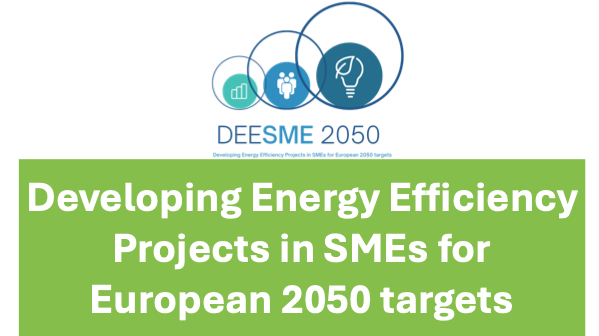 Energy Efficiency
Energy EfficiencySpotlight on EU funded project – Unlocking SME potential: Financing energy efficiency for a sustainable future
Summary
The paper discusses the challenges Europe faces in promoting sustainability and resilience, highlighting the key role of small and medium-sized enterprises (SMEs) in the European economy. It emphasizes the importance of enhancing energy efficiency within SMEs, connecting it to Europe's health due to SMEs' significant contribution to employment and value generation. The paper references the DEESME 2050 project, demonstrating the potential benefits of energy performance improvements in SMEs, particularly in reducing greenhouse gas emissions and bolstering resilience. However, it points out the financial and capacity constraints SMEs face in achieving these improvements.
The International Energy Agency's Energy Efficiency 2024 report is cited, suggesting that policy implementation needs to accelerate, and investment in energy efficiency must increase to align with global climate goals. The paper also refers to past efforts, like the Energy Efficiency Financial Institutions Group, which worked toward enhancing energy efficiency investment in Europe.
The EU's commitment to reduce net greenhouse gas emissions by at least 55% by 2030 is detailed, as well as the establishment of the European Energy Efficiency Financing Coalition in 2024 to foster investment in energy efficiency. The need for financial support for SMEs and the role of intermediaries, such as the not-for-profit organisation Energy Efficiency in Industrial Processes (EEIP), are underscored.
The paper concludes by stressing the centrality of SMEs to Europe's economy and innovation, the importance of energy efficiency for competitiveness, and the urgent need for scaling up support to SMEs, using the ongoing DEESME 2050 project as an example of effective assistance to the furniture industry's SMEs.
Open full article
Spotlight on EU funded project – Unlocking SME potential: Financing energy efficiency for a sustainable future
Europe is juggling many issues at once, at a time when we are striving for greater sustainability and resilience. Whether it be the need for addressing climate change and environmental protection, greater military protection, international trade concerns, improved employment, improved competitiveness, greater energy security, greater economic stability and more, Europe is confronting a range of endless issues that often seem in conflict with each other.
We cannot address everything with the snap of our fingers. Let’s stand back here and look at Europe’s largest employer sector – small and medium-sized enterprises (SMEs). SMEs generate nearly 53% of Europe’s added value, employ close to 89 million people, and make up 99.8% of all enterprises. Their health is Europe’s health.
One EU-funded project, DEESME 2050, is trying to show the importance of improved energy efficiency in SMEs. While it deals with the furniture sector in four EU member states, it has important lessons. The project shows the need for a well-organised, systematic and thorough approach to improving the energy performance of the individual companies. Those SMEs normally do not have the financial or human capacity to undertake such improvements on their own. The project gives a hint at the huge potential to help the individual companies and for all of us in Europe to benefit from their GHG emissions reductions and their improved resilience to other urgent concerns. We will come back to the project, but it is important to see why we should be doing more and what is happening in Europe to help.
“Policy implementation must accelerate”
As the IEA wrote in its recent Energy Efficiency 2024 report, “policy implementation must accelerate to improve energy efficiency progress and align with global climate ambitions.” That means increased investment. The IEA goes on that energy efficiency investment has risen by nearly 50% since 2019 but the investment flattened out in 2024. Heaven knows what this year will be like. Those are global numbers but give an indication of the challenges we face in Europe. Some estimates show Europe needs 150 – 200 billion euros per year for energy efficiency in all sectors to meet 2030 objectives.
For 10 years, from 2013 to 2023, the European Commission together with the United Nations Environment Programme Finance Initiative, co-convened the Energy Efficiency Financial Institutions Group (EEFIG) that brought together the full range of stakeholders. EEFIG identifed the critical success factors, policies, market instruments and financing solutions to increase energy efficiency investments in Europe in the buildings, industry and SME sectors. Yes, there were accomplishments over those 10 years but there was a moving target with the need for improved energy efficiency becoming all the more important as the EU increased its climate and energy objectives.
In 2023, the EU adopted a set of Commission proposals to make the EU's climate, energy, transport and taxation policies fit for reducing net GHG emissions by at least 55% by 2030, compared to 1990 levels. As the Commission website stated, this would enable the EU to become the first climate-neutral continent by 2050. Furthermore, under the revised Energy Efficiency Directive, and as part of their energy efficiency obligation schemes, EU countries will be required to achieve an average annual energy savings rate of 1.49% from 2024 to 2030, up from the 2021–2023 requirement of 0.8%, driving energy savings in critical sectors like buildings, industry, and transport.
To help, in 2024 the Commission created the European Energy Efficiency Financing Coalition (EEEFC) “to create a favourable market environment for energy efficiency investments and to scale up the private financing needed in energy efficiency to help achieve the EU’s energy and climate targets for 2030 and 2050.” Importantly, there will be “national hubs” to represent the Coalition at the national level and there will be expert working groups working on specific themes. Undoubtedly, this Coalition will be a valuable resource for SMEs.
An important lesson from EEFIG concerning SMEs
With the first General Assembly of EEEFC on May 20th it is useful to look back at some of the learnings from the EEFIG learnings concerning SMEs to see what it takes to ensure there is sufficient financial support to help contribute towards achieving long-term climate and energy transition objectives.
Importantly, there were financial resources available but too many SMEs lack capacity to build a business case on any possible energy efficiency measure that they can take to financial institutions and funding sources (e.g. national or regional funds or energy efficiency networks). The EEFIG report from the working group on industry, which I led, concluded that “This is where an intermediary (e.g. ESCOs, qualified auditors, CMVP) can provide important support.” Our work at the not-for-profit organisation, Energy Efficiency in Industrial Processes (EEIP), confirms that. With a decade of hands-on experience and stakeholder engagement, EEIP plays a crucial role in bridging the gap between SMEs and sustainable finance, ensuring that no company is left behind in Europe’s green transition
This is not to say financial institutions are “less” important. Far from it. In another EEFIG working group report, best practice was found in Ireland: “the Strategic Banking Corporation of Ireland provides an important example of how a state-owned bank can work directly with SMEs in particular, to take an overall sector approach which includes a low-cost loan scheme, help with providing guarantees in building the business case for lenders, helping to standardise processes and provide case studies.”
We saw after the shock of high natural gas prices at the beginning of the Ukraine-Russia crisis that many energy-intensive SMEs had to close down, even if just temporarily. They are the lifeblood of Europe because of their impact on the European economy and are major leaders in innovation. Yes, improved energy efficiency definitely helps their competitiveness – and keep them in business.
Where DEESME 2050 helps
There are a number of EU-funded projects that are or have helped SMEs to improve energy efficiency and sustainability. One such on-going project, that EEIP is involved in, is DEESME 2050, mentioned above, working in four countries with SMEs related to the furniture industry. DEESME 2050 builds on the developed DEESME multiple benefits approach to capacitate, assist and motivate companies to overcome the obstacles in energy efficiency measures uptake in the furniture sector and its value chain. Over 70 companies have had energy audits and specialised training. Once the energy efficiency measures have been identified and prepared for financing, there is a need to match the needs of the individual SMEs with the capacity and expectation of the financial institutions. That is what is on-going right now. The project has a further six months to run and this is when we should start seeing the key results.
Final word
SMEs are vital to the economic well-being of Europe. To improve competitiveness, improved energy efficiency certainly helps. Supporting SMEs in energy efficiency isn’t just good economics, it’s smart policy and common sense. The time to scale up is now.



